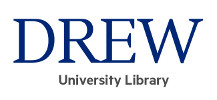 Library Guides
Library Guides Library Guides
Library GuidesDrew has several powerful History database. There are some good general purpose databases you can use, but to start, I strongly suggest Subject-Specific databases, which were designed specifically to help you find the best resources for your topic. Drew has a staggeringly-large collection of books and articles; don't settle for just any article about you topic - use these tools to find the best article on your topic!
For US and Canadian History, start with America: History and Life, the premiere resource for US and Canadian History.
For Non-US History, look at Historical Abstracts.
In addition to being key-word searchable, they include Subject Headings and Abstracts, which makes it much easier to find the materials you're looking for.
Still having trouble finding articles? Check out our broader Humanities databases, including: JSTOR, Project Muse, and ScholarSearch
Say you've found the perfect article. Great! How do find more like it? There are a few ways.
Read the bibliography. A peer-reviewed article will list all the articles it has built upon. Though these articles will be older, they will be useful.
See who has cited the article since it was published. If you search the title of the article in Google Scholar, you can see which recent works have cited it. Presumably, these works will be on the same topic.
Finally, when you find an article in our databases, you'll see Subject Terms. Use these to find similar articles.

If you are searching in Scholar Search, you will see both books and articles.
Some databases have full text incorporated in them; almost all of our databases, however, are connected to "Find it @Drew" which will check all our electronic journal sources to see if an article is available.
If the articles are directly connected into the database, it will give you a direct link to the PDF or HTML or Linked full text; some items will be not in our collection and you'll be directed to request them through Interlibrary Loan.
For many, you'll need to click Find it @Drew to see whether it's available electronically:

When you click Find it @Drew you will be taken to a page that will offer you a list of links to the resource in our electronic journal holdings. (Sometimes we have a journal article via more than one database; that's why you see multiple links. Click one of the links to get to the full text:

If we don't have access to the journal/article online, Find it @Drew will give you links
NOTE: The first time you request an article or book via ILLiad (our InterLibraryLoan system), you will be asked to fill out a short form. It may take several days to receive an article via InterLibraryLoan; books can take longer.
If you already have information about a specific article (author, journal or magazine title, title of the article, etc.), use Drew's Journal List Search. Enter the title of the journal or magazine, and then drill down to the specific item you need.
Boolean Search Terms
AND - Results will contain both words [anywhere, not always next to eachother].
OR - Results will contain at least one word. Example: Britain or "United Kingdom".
Quotation Marks - Search for phrase. A search for "New Jersey" is not the same as a search for New Jersey.
Parentheses - Like in math, it searches here first. Example: Salary and (Teacher or Educator).
Star / Asterisk - Use to capture variations of the same word. Example: Wom* will include "women," "woman," "womens," "womanhood" etc. WARNING: Be mindful that you can get unintended results. "wom*" will also turn up search results for "wombs," "womanizers," and "wombats."
Common Words - Avoid these words. Examples: That, which, the, a, an.
AND NOT - Omits from search. Example: Kings and medieval and not France
NEAR - Will find the two search terms within 16 terms of one another. Example: Medieval and (King near England).
Searching with Boolean
Searching a catalog can be tricky, so we use Boolean Search Logic.
Steps to using Boolean
1) Break your idea into nouns. "What was Thomas Jefferson's views on the French Revolution?"
The three key nouns are 1) Thomas Jefferson 2) views/opinions 3) French Revolution.
2) Rephrase it in boolean. Focus on tangible nouns first. "Thomas Jefferson" and "French Revolution". Start with an "anywhere" keyword search.
3) Narrow search results by adding to the search: "Thomas Jefferson" and "French Revolution" and (opinions or views)
4) Narrow search with Title searches. A book about Jefferson and the French Revolution will probably have those in the title! If you are still getting too many search results, try searching for these (and other) keywords in the "title" option.
5) Once you find a book on your topic, you can find even more using Subject or Term searches. The French Revolution is officially cataloged as "France--History--Revolution, 1789-1799". Knowing this, you can find all our books on the topic. Jefferson also has an official catagory: "Jefferson, Thomas, 1743-1826" If you search for both, you can find all book covering both topics! This works especially well in WorldCat.
The above approach works with WorldCat, our Catalog, and article/database searches!
Questions? Need Help? Email reference@drew.edu
Drew University Library, http://www.drew.edu/library